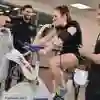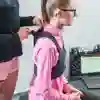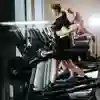



Learn to apply theoretical knowledge to high-level coaching and open up a range of careers with this hands-on degree.
Based in fully-equipped facilities following a recent £16 million investment in our sports infrastructure, you’ll combine the science with real-world experience from multiple placements to develop the skills to work with players and teams of all abilities.
And thanks to career-boosting opportunities like our annual Student Thesis Conference, you’ll be able to set yourself apart from the competition when you graduate.
About this course
This course provides an ideal foundation for anyone wanting to begin a career in coaching players and teams to maximise their training and performance, as well as those interested in teaching physical education.
With a strong scientific focus throughout the course, you’ll study the theory that underpins performance and practical application, and develop the skills to coach people of all abilities and ages, from grassroots to elite level, and across all sports.
You’ll be taught by experts in their field during your time on campus and our links with local authority sports development units (and other organisations) open up opportunities for work experience, coaching education courses, workshops and events as part of your degree.
Plus, thanks to career-boosting opportunities like our annual Student Thesis Conference, and our connections with Hull City, Hull KR and Hull FC (all three clubs have former Hull students working for them), you’ll have opportunities here that you can’t get anywhere else.
As well as teaching you the fundamental skills to coach and oversee the development of others, we also invest in your own potential with our Talented Athlete Programme.
Scholarships are offered to selected high-performing athletes and include a tailored package of support, advice, mentoring and personal development.
Study speed, stamina and agility at your own pace
Module options
Each year, you’ll study modules worth a certain number of credits, and you need 120 credits per year. Most modules are 20 credits – so you’ll study six modules each year. Some longer modules, such as a dissertation, are worth more. In these cases, you’ll study fewer modules - but the number of credits will always add up to 120. Some modules are compulsory, some are optional, so you can build a course that’s right for you.
Filters
Human Physiology and Nutrition
Examine the key body systems including the circulatory, respiratory, nervous and gastrointestinal – in relation to metabolism, energy production and macronutrient function.
compulsory
20 credits
Principles of Anatomy and Biomechanics
Explore anatomical structures of the musculoskeletal system and how they relate to functional human movement.
compulsory
20 credits
Sport, Health and Exercise Psychology
This module provides you with knowledge of various psychological assessment tools and techniques, such as anxiety inventories, imagery, relaxation and goal setting.
compulsory
20 credits
Conducting Science in Sport, Exercise and Rehabilitation
A solid grounding in to the scientific practice underlying the subject. It explores and critiques how data is collected and analysed.
compulsory
20 credits
Introduction to Coaching Pedagogy
This module will provide a critical introduction to a number of pedagogical theories relevant to the facilitation of athlete learning.
compulsory
20 credits
Introduction to Community Coaching
Discover how to examine sport coaching practice in a community sport context. You’ll explore ways which you can design and deliver impactful coaching sessions targeted at underrepresented groups in the community. You’ll have the opportunity to work collaboratively with your peers to construct and deliver an appropriate coaching session for a target population group e.g., elderly, youth, women, disability, children.
compulsory
20 credits
Introduction to Strength and Conditioning
Analyse the physical demands of a sport or activity and design scientifically informed training programmes. You'll also learn the basics of Strength and Conditioning coaching.
compulsory
20 credits
Social Psychology of Sport, Health and Exercise
Examine the effects of psychosocial dynamics in performance sport, health and exercise. You'll explore issues like muscle dysmorphia, drug use in sport and barriers to exercise.
compulsory
20 credits
Applied Issues in Strength and Conditioning
This module introduces you to fitness assessment and testing and how to use information to design training programmes. It also advances your strength and conditioning coaching experience.
compulsory
20 credits
Our facilities


Watchlist
Degrees that live up to life
Course montage
1 min
Dr John Toner
Course overview
2 mins
Andy Ayre
Student Story
2 mins
Facilities
Course Highlight
3 mins
Strength and Conditioning Course Overview
Course overview
2 mins
Featured academics
FIFA, the International Olympic Committee and the World Anti-Doping Agency. They’re all on the list of sporting heavyweights our academics have worked with.
You’ll also be able to benefit from their experience in elite sport, coaching or performance roles, as well as their latest game-changing research.

Dr Christopher McLaren-Towlson
Lecturer
Christopher is a lecturer in Sports Coaching and Performance Science and a module leader at both Level 5 and 6 aspects of the programme. His previous research has been funded by FIFA, UEFA, Hull City and Manchester City.

Dr Laura Gale
Lecturer
Laura has been a Lecturer in Sport Coaching and Performance at the University of Hull since September 2023. Prior to joining Hull, Laura has worked as a Lecturer in Sport Coaching at other universities like Manchester Met and Leeds Trinity.
Entry Requirements
What do I need?
This course is currently available through Clearing, which means our entry requirements are a bit different to what they would normally be.
At Hull, you're a name not a number. During Clearing, we look at all of your qualifications and experience, not just your academic grades. We may be able to offer you a place whatever your situation. Get started by completing our eligibility checker, and find out immediately if you could study at the University of Hull.
Have questions? Our admissions team will be happy to help.
Fees & Funding
How much is it?

Future prospects
Our graduates have valuable transferable skills, sound theoretical knowledge and real-world practical experience.
Hull graduates have gone on to work in multiple roles within professional sport, including for Arsenal FC, plus positions within primary and secondary teaching, strength and conditioning, performance analysis and sports development.
Thanks to our annual Student Thesis Conference, you’ll have the chance to network with potential future employers throughout your degree, and our careers team will also be on-hand to help guide your next steps after you graduate.
Become part of the next generation of futuremakers
Like what you've seen? Then it's time to apply.
The standard way is to apply through UCAS. This will give you the chance to showcase your skills qualities and passion for the subject, as well as providing us with your academic qualifications.
Not ready to apply yet?
Visit our next Open Day, and see all that the University of Hull has to offer. Talk to our lecturers about your subject, find out what university is really like from our current students, and take a tour of our beautiful campus and amazing facilities.
You may also be interested in...
94% employability (Sport, Exercise and Rehabilitation Sciences) UK domicile full-time first degree leavers; Higher Education Graduate Outcomes statistics, for the academic year 2022/23, published by the Higher Education Statistics Agency June 2025.
Ranked 8th in the UK for Teaching on my Course. National Student Survey (NSS) 2025, HEIs only
Sport and Exercise Science: Ranked 1st in the UK for academic support. National Student Survey (NSS) 2025, HEIs only
Sports Science: Ranked 4th in the UK for Teaching Quality. The Times and Sunday Times Good University Guide 2026.
All modules presented on this course page are subject to availability and this list may change at any time.